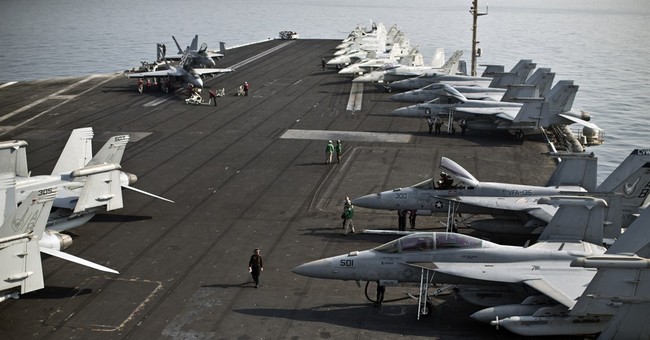
Article by Mike Ford in "RedState":
As reported by NBC News, the Captain of the U.S.S. Roosevelt Aircraft Carrier was relieved from duty because of a lack of confidence in his ability to command. From the article:
Capt. Brett Crozier, who commands the Roosevelt, an aircraft carrier with a crew of nearly 5,000, was relieved of his command Thursday, but he will keep his rank and remain in the Navy.
Crozier raised the alarm this week, sending a strongly worded letter to Navy leadership that detailed his concerns about the spread of the virus on the ship. The letter leaked to the media and generated a series of headlines.
At first glance and as hyped by leftist media, this could look like the U.S. Navy covering its collective backside. In this case, I dissent.
First of all, a little background. In the staff planning process for current or future combat operations (war planning) the military has a concept known as CCIR, Commander’s Critical Information Requirements. These aren’t merely “interesting” things the Boss would like to know, rather these items would be critical to his mission success. This information is divided into three categories.
—Priority Information Requirements (PIR): What the Commander needs to know about the enemy.
—Friendly Force Information Requirements (FFIR): What the Commander needs to know about his own forces.
—Essential Elements of Friendly Information (EEFI): What information abut his own forces, the Commanders wants to hide from the enemy.
Note, when using “commander” in this sense, we are referring to all commanders, from a Company Commander leading an Infantry Company, looking across the DMZ in Korea, all the way up to the President of the United States who is in command of all the Armed Forces of these United States.
When he communicated the the not-in-doubt imminent danger his crew faced from the spread of Wuhan virus on board his vessel, Captain Crozier was providing critical FFIR to his chain of command…his senior commanders. This is information they needed to know about one of their critical assets. When a capital ship of the United States Navy is about to become non mission capable, that is a huge event. The problem, is how he decided to go about communicating this critical information.
Captain Crozier composed a memorandum and sent it through unsecured channels and supposedly sent copies to several other folks who may or may not have had clearance or need to know. By doing so, he provided EEFI to our global competitors. He let them know that one of our major strategic assets was about to be non mission capable. In short, he violated standing orders regarding Operational Security (OPSEC). Even more egregious, as pointed out by one of my military comrades, he exposed the lack of readiness of an entire Carrier Battle Group, not just his own vessel.
Captain Crozier wrote in his unsecured email, “We are not at war. Sailors do not need to die. If we do not act now, we are failing to properly take care of our most trusted asset — our Sailors.”
That sounds oh so very noble. However, it also sounds like the mewling of a junior officer who had not been through a grueling selection process for a senior leadership position as Commander of an American Strategic Asset. I had this kind of discussion with one of my subordinate commanders back in 2005. He had come to me wanting a waiver for one of his Sergeants who had come up “hot” on a drug test. His argument was that this particular NCO was a “good Soldier” and I should retain him in the Army. My response to him was, “How could he (the Company Commander) profess to his other ‘good Soldiers’ that he was providing a safe, drug free work environment when he was going to bat for a substandard ‘leader?’”
This is the same issue. Although this Captain might have been looking out for the welfare of his Sailors, he obviously has a lot to learn about the Chain of Command and Operational Security. As acknowledged by the Secretary of the Navy, this Captain of a United States Navy Capital Ship, had all the tools necessary to transmit an Operational Immediate message through secure channels to convey his concerns. He chose a different path. The fact that he did such through non secure channels and to many persons not cleared for the information, does indeed cast question on his ability to command. The SECNAV was entirely correct to relieve this officer.
https://www.redstate.com/darth641/2020/04/04/opinion-navy-captain-properly-relieved/
